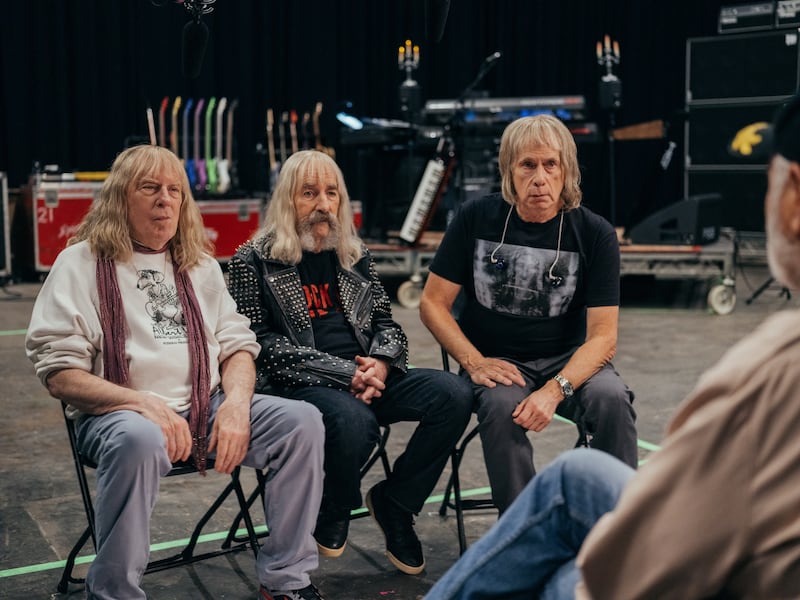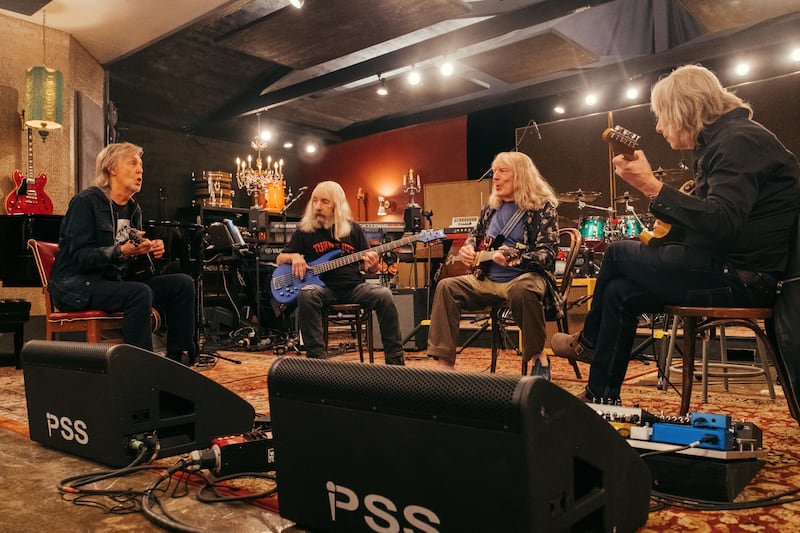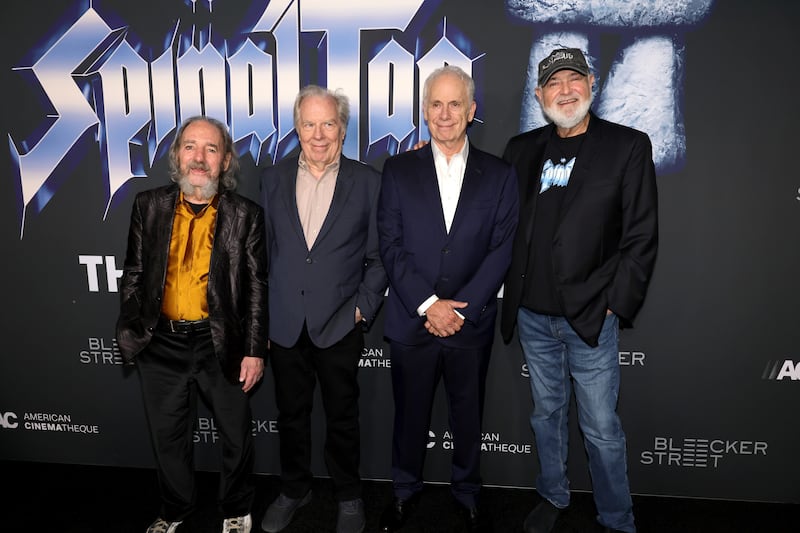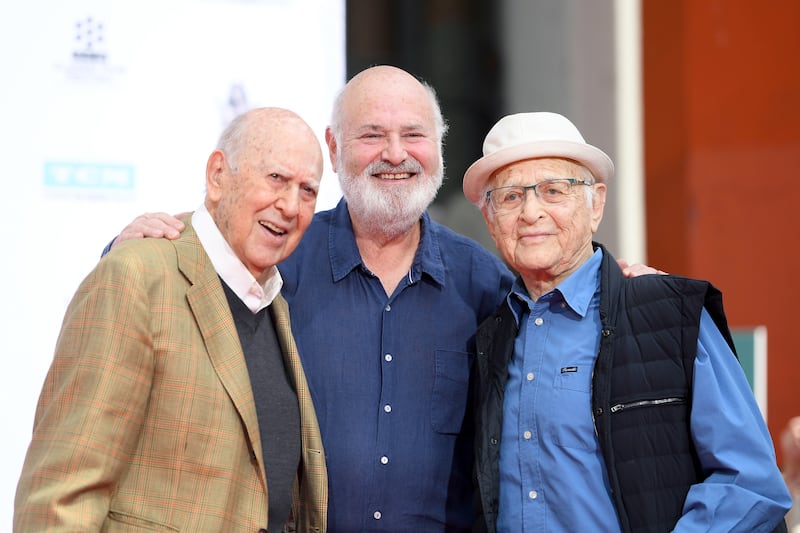Over the course of his long and distinguished career, Rob Reiner has directed some of the most beloved and acclaimed films in Hollywood history. But he had never directed a sequel until Spinal Tap 2: The End Continues.
In this episode of The Last Laugh podcast, Reiner breaks down why he decided to reunite with Christopher Guest, Michael McKean, and Harry Shearer for one last mockumentary 41 years after they invented the genre with This Is Spinal Tap. He talks about how the comedy of the film has evolved now that they are in their 70s and 80s, and the secret to playing the straight man opposite someone as effortlessly funny as Guest.
Reiner also gets into the state of America under Trump 2.0, how Elon Musk drove him away from Twitter, and what he learned about being a politically outspoken celebrity from Norman Lear and Jane Fonda. Finally, he reflects on his relationship with his late father Carl Reiner, recalls the first time he met Mel Brooks, and considers the enduring legacy of classic films like The Princess Bride and When Harry Met Sally.
This Is Spinal Tap may be considered one of the funniest and most influential comedy films of all time today. But when the film first came out in 1984, Reiner says, “nobody even knew what the heck this thing was.”
“They thought people thought it was a real band,” he says, “and asked me, why did you make a movie about a band nobody ever heard of?” It wasn’t until it developed a cult following and started entering the culture in unexpected ways that people started clamoring for a sequel. “We always felt, no, this is it, we’ve done it and we’re not going to be able to do better.”
Due to some unfortunate contract negotiations, the film’s four stars and writers “never made any money” from the project, even as it helped launch their careers. It was Shearer who ultimately decided to sue the company that had taken control of the property and get the rights back.
Even then, Reiner wasn’t sure he really wanted to revisit the fictional heavy metal band, but the more they talked through what the story could be, the more excited they got about making the film that ultimately landed in theaters this past weekend. Just as the original film satirized the state of the music business in the mid-’80s, Spinal Tap 2 takes on the experience of aging rockers who just can’t quit each other despite decades of “bad blood.”
Below is an edited excerpt from our conversation. You can listen to the whole thing by following The Last Laugh on Apple Podcasts, Spotify, or wherever you get your podcasts, and be the first to hear new episodes when they are released every Wednesday.
There’s a line that stood out to me from Harry Shearer’s character in the original Spinal Tap where he says something along the lines of, “Do we really want to be doing this when we’re 45?” Which is pretty funny considering where everybody is now. So how did everyone’s age open up new avenues for comedy that didn’t exist when you were making the first one?
Well, you go with the old jokes! Even though they’re now in their seventies and eighties, they haven’t grown musically or personally. The only thing they might have grown is maybe some skin tabs, but it’s basically the same band. But we do trade on what it is to be old and still playing rock and roll. It’s interesting you mentioned that he said we’re gonna be farting around the stage when we’re 45. When I was a kid in the sixties, there was a saying, “Never trust anybody over 30.”

What did you think of that saying once you reached 30?
I realized nobody was going to trust me, and maybe I should up the age. And by the way, as you get older, now I’m looking for a nine. I’m 78 now. I’m looking for a nine. At least a nine somewhere. I don’t have to be a hundred, but a nine would be good. If I make it that far, I’ll be happy.
I’m curious about what you feel like the key is to playing a great straight man, which I think you do in these films. Your father, Carl Reiner, was also a legendary straight man. Especially when you think about something like the iconic “goes to 11” scene where you’re teeing up Chris Guest, what’s your strategy for improvisations like that one?
It’s very interesting that you mention my dad because my dad was a great straight man to Mel Brooks in “2000 Year Old Man.” It takes understanding timing and understanding what you’re doing with the person who’s going to get the laughs to be able to get the laughs. One of the things my father would do—and he was the best out of anybody—is when he could push Mel into a corner where Mel didn’t know where to go, it would fire off in Mel’s head something that you wouldn’t expect. And I did that with Chris in that scene where he shows me the amp and he shows how it’s one louder and it goes to 11. And I said, well, I don’t understand, why wouldn’t you just make the top number a little louder? You can see that he’s stumped, he doesn’t know what to say. And that’s where the comedy comes, that long pause before he says, “Well, this goes to 11.” I mean, he didn’t have an answer! And that, to me, is what makes it work. And I learned that from my father.
This film is a return to comedy for you after the much more dramatic, political work that you’ve done in the later part of your career. Did you feel like this is what the country needs right now, a hard comedy like this?
I don’t think in those terms, although I do agree that we need to laugh now more than ever. But that’s not why we did it. We did it because we had a story to tell. And I’ve got to say, there’s emotion in both films. Normally, satire and emotion don’t like to be with each other, they bump up against each other. But I felt that if you’re going to tell a story, if it’s just a straight satire and it doesn’t have any kind of emotional ballast to it, it’s not as satisfying. So I found that the relationship between David and Nigel and the fact that they knew each other from the time they were little kids, and they had this bond to each other, they’re like brothers—that was the basis for where conflict could come. It’s there in the first film, but in the second film, I think it’s even more, because when you get older, those emotions run even deeper. So it was important to me to try to marry those two things. And I hope I did. So, yeah, it’s mostly a comedy, there’s a lot of laughs, but you’ve got to have that emotional component as well.

It’s not a very political film, like many of your other ones, except for one Stormy Daniel’s reference that I caught. But you and I have discussed politics several times over this past decade, so I wanted to take your temperature on how you’re feeling right now. Things are changing so much every day, every hour. Are you just as engaged in the news day to day as you always were?
You know, I read The New York Times, the headlines. I can’t read too much past some of the headlines because it’s really disturbing. For those of us—my wife, her mother was in Auschwitz and she lost her entire family there, she was the only survivor, my Uncle Charlie was part of D-Day and fought in 11 major battles. My second father is Norman Lear—another big figure in my life—he flew 52 bombing missions over Nazi Germany, and millions and millions of people died so that we wouldn’t have what we see happening now in America. And that is a very disturbing thing. And make no mistake, this is where we are right now, and we have to become aware of it.
And what do we do about that? Well, we have to do whatever we can. And so I’m trying to push back as best I can in ways that I know how, and hopefully we can preserve democracy because it’s a 250 year experiment that has, in fits and starts, improved itself. I mean, there was a time when women couldn’t vote, now they can. There was a time where Black people couldn’t vote, now they can. We had a Black president. We’ve been flawed—incredibly flawed—but we’ve moved forward. This is the first time I’m seeing this thing that is so difficult to hold onto, that is so ephemeral, being destroyed in less than a year. The institutions only hold if people agree that the rule of law is important, that the Constitution is important. If we don’t believe that, then you can do whatever you want. And that’s what’s happening now.
So I’m hoping we’ll survive this. And if we do, it’s going to take a long time to rebuild the shining city on the hill, the beacon to the rest of the world. This used to be the place that welcomed immigrants. Diversity was our strength. And now people are being thrown out of the country without due process. It’s nightmarish what’s happening in America. And hopefully people will be able to see that. It’s as bad as anything could be in this country at this point. The hope was, if we could have one country that allows people from all ethnicities, colors, religions, sexual preferences, all living in one place, it would prove that the world can be one. This was the experiment. This was the place we were going to do it. And right now, it isn’t happening.

One place that you used to be very outspoken was Twitter, now called X. I believe you deleted your account after the election. Was it just the reelection of Trump that did that? Or what made you think, I have to stop doing this?
It wasn’t that, it was when Elon Musk bought Twitter, turned it into X and it became a platform for this kind of authoritarian point of view. And at one point, I tried to get back on. I had like two and a half million followers. I tried to get back on, but I couldn’t use my name because they had taken it, so I called myself “The Actual Rob Reiner” or something like that. And so, from two and a half million followers, I went to like a hundred, 98. But there are other ways to do this and we’ll have to find them.
I did notice every time you would post something political you’d have about a hundred trolls responding, calling you “Meathead.”
I was happy when they called me that! I mean, it went from there to “Libtard,” and then from Libtard it went to “pedophile” to “you were on Epstein’s Island.” It’s like… Wow.

You mentioned Norman Lear, the creator of All In the Family, who you’ve talked about as a mentor. I think he really pioneered this certain way of using both comedy and entertainment, but also his celebrity, to promote a political message. What did you learn from him about being outspoken and saying what’s on your mind, not being afraid to speak up?
The very thing you’re saying, which is you can use your fame or celebrity. If you have something you want to get across, a policy issue that you want to highlight, or you want to try to see if you can push forward, you can marry those things. Listen, I’m going to be called these things no matter what. But there was never a time that I went on to talk about either early childhood or marriage equality or the environment that I couldn’t answer fifth, sixth, seventh tier questions. Because I’m going to be tarred as a celebrity. But I can go on with Tucker Carlson, I can go on with Laura Ingraham. They can’t stump me. Because I’ve worked in government. Seven years, I was up in Sacramento running a commission. I know how policy works. I know the intersection between policy, politics and programs that push a policy forward. You can’t ask me a question that I’m not going to have the answer to. So you can call me whatever you want, but I’m going to know that I know what I’m talking about.
I had a good conversation the other day with Jane Fonda. And Jane has a certain reputation too. And she said something that hit me, which is during the fifties, there was McCarthyism and there was a contingency in Hollywood that pushed back on it because Hollywood people were being blacklisted and couldn’t get jobs. And there were people that formed a commission, a group to push back on it. Her father, Henry Fonda was part of that. And she said, there has to be something where we can galvanize people who are famous, because you get attention. They can criticize you, but you get attention. Look at Donald Trump. He’s got all the attention in the world and doesn’t know what the hell he’s talking about. But you can get attention. And maybe there’s a way that we can harness that to start pushing back on autocracy and fascism. We haven’t figured that out yet, but hopefully we can.
Listen to the episode now and follow The Last Laugh on Apple Podcasts, Spotify, or wherever you get your podcasts to be the first to hear new episodes when they are released every Wednesday.
The post Rob Reiner Takes on Trump, Elon and the Return of ‘Spinal Tap’ appeared first on The Daily Beast.




